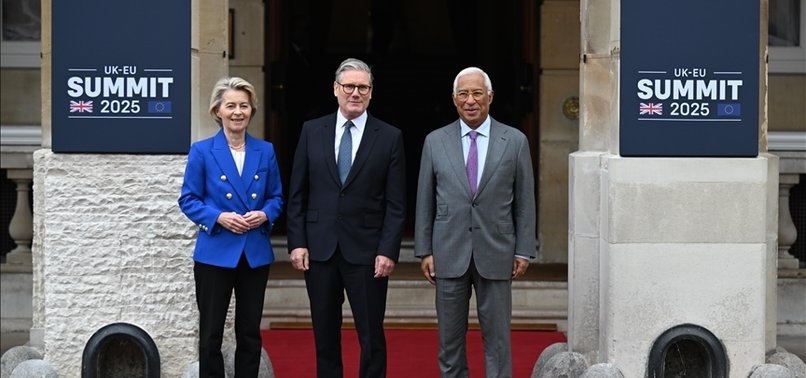British Prime Minister Keir Starmer said Monday that “Britain is back on the world stage,” as he joined European Commission President Ursula von der Leyen and European Council President Antonio Costa at a press conference in London following a Brexit summit.
The summit, held in the capital, marks what all three leaders described as the beginning of a “new strategic partnership” between Britain and Brussels, years after post-Brexit tensions strained relations.
Antonio Costa, speaking first, said the two sides had “worked to rebuild trust,” adding: “This is the start of a new strategic partnership.”
Von der Leyen then told reporters that the UK and EU are “turning the page.” She said the new security and defense pact between the two sides “covers lots of topics” and “will boost defense cooperation.”
She also confirmed it was “the first step toward the UK’s participation in the EU’s joint procurement program.”
– ‘BRITAIN IS BACK ON THE WORLD STAGE’
Starmer, speaking last, opened with a bullish tone, saying: “Ladies and gentlemen, Britain is back on the world stage, working with our partners, doing deals that will grow our economy and putting more money in the pockets of working people.
In the last two weeks alone, we have delivered trade deals with India and the US, and that means jobs saved jobs, creating more growth and a huge vote of confidence in this country.”
He called the agreement a “landmark one,” describing it as a “win-win for both sides.”
“It gives us unprecedented access to the EU market, the best of any country outside of the EU or Efta, all while sticking to the red lines in our manifesto about not rejoining the single market, the customs union, and no return to freedom of movement. So, this deal is good for both sides.”
Starmer also confirmed the new SPS (sanitary and phytosanitary) deal would make agricultural trade with the EU easier and cheaper.
“After a long absence, it will allow burgers and shellfish and other products to be sold again in the EU.”
He said the defense deal would open up “opportunities for the defense manufacturing sector,” and revealed that new cooperation on emissions trading would save British firms up to £800 million ($1 billion) in EU carbon taxes.
However, opposition leader Kemi Badenoch responded critically, pointing to the five tests she had set for Labour’s EU reset:
“They were that the deal should involve: ‘1) no backsliding on free movement or compulsory asylum transfers; 2) no new money paid to the EU; 3) no reduction in our fishing rights; 4) no rule taking, dynamic alignment or European Court jurisdiction; and 5) no compromise on the primacy of NATO as the cornerstone of European security.'”
The Green party has welcomed the deal, saying it is “a step in the right direction”.
“Today’s reset is being broadly welcomed by businesses and is good news for UK consumers faced with the cost of living crisis. There is also hope for young people who want to live, work, study and form friendships freely across Europe,” Carla Denyer, the party’s co-leader, said in a statement.
“But today’s agreement is definitely a step in the right direction and moves us forward from a place where Reform and the Tories would like us to stay stuck. Their Brexit betrayal rhetoric shows they are willing to disregard the damage inflicted on the country through Brexit and ignore the fact that the vast majority of the UK public now believe the UK was wrong to leave the EU,” she added.
The EU remains the UK’s largest trading partner. Since Brexit, UK exports to the bloc have fallen by 21% and imports by 7%, according to official figures.
The deal reopens EU markets to a range of British meat products, including burgers and sausages, which had faced restrictions since the UK’s departure from the 27-member bloc.
Also included in the agreement is a commitment to link the UK and EU’s Emissions Trading Systems (ETS), a move designed to bolster energy security and avoid penalties under the EU’s incoming carbon border tax.
On the security front, the UK will, for the first time, enter discussions on gaining access to the EU’s facial recognition data, in addition to current cooperation on fingerprints, DNA, and vehicle registration.
The UK and EU also agreed to formalize defense ties through a new Security and Defense Partnership.
This would enable UK firms to participate in the EU’s proposed £150 billion ($200 billion) “Security Action for Europe” fund, a move expected to support thousands of British jobs.


